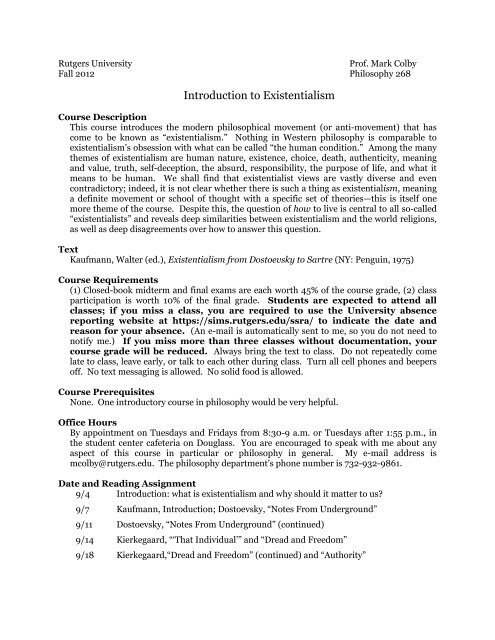Introduction to Existentialism - Department of Philosophy
Introduction to Existentialism - Department of Philosophy
Introduction to Existentialism - Department of Philosophy
Create successful ePaper yourself
Turn your PDF publications into a flip-book with our unique Google optimized e-Paper software.
Rutgers University Pr<strong>of</strong>. Mark Colby<br />
Fall 2012 <strong>Philosophy</strong> 268<br />
<strong>Introduction</strong> <strong>to</strong> <strong>Existentialism</strong><br />
Course Description<br />
This course introduces the modern philosophical movement (or anti-movement) that has<br />
come <strong>to</strong> be known as “existentialism.” Nothing in Western philosophy is comparable <strong>to</strong><br />
existentialism’s obsession with what can be called “the human condition.” Among the many<br />
themes <strong>of</strong> existentialism are human nature, existence, choice, death, authenticity, meaning<br />
and value, truth, self-deception, the absurd, responsibility, the purpose <strong>of</strong> life, and what it<br />
means <strong>to</strong> be human. We shall find that existentialist views are vastly diverse and even<br />
contradic<strong>to</strong>ry; indeed, it is not clear whether there is such a thing as existentialism, meaning<br />
a definite movement or school <strong>of</strong> thought with a specific set <strong>of</strong> theories—this is itself one<br />
more theme <strong>of</strong> the course. Despite this, the question <strong>of</strong> how <strong>to</strong> live is central <strong>to</strong> all so-called<br />
“existentialists” and reveals deep similarities between existentialism and the world religions,<br />
as well as deep disagreements over how <strong>to</strong> answer this question.<br />
Text<br />
Kaufmann, Walter (ed.), <strong>Existentialism</strong> from Dos<strong>to</strong>evsky <strong>to</strong> Sartre (NY: Penguin, 1975)<br />
Course Requirements<br />
(1) Closed-book midterm and final exams are each worth 45% <strong>of</strong> the course grade, (2) class<br />
participation is worth 10% <strong>of</strong> the final grade. Students are expected <strong>to</strong> attend all<br />
classes; if you miss a class, you are required <strong>to</strong> use the University absence<br />
reporting website at https://sims.rutgers.edu/ssra/ <strong>to</strong> indicate the date and<br />
reason for your absence. (An e-mail is au<strong>to</strong>matically sent <strong>to</strong> me, so you do not need <strong>to</strong><br />
notify me.) If you miss more than three classes without documentation, your<br />
course grade will be reduced. Always bring the text <strong>to</strong> class. Do not repeatedly come<br />
late <strong>to</strong> class, leave early, or talk <strong>to</strong> each other during class. Turn all cell phones and beepers<br />
<strong>of</strong>f. No text messaging is allowed. No solid food is allowed.<br />
Course Prerequisites<br />
None. One introduc<strong>to</strong>ry course in philosophy would be very helpful.<br />
Office Hours<br />
By appointment on Tuesdays and Fridays from 8:30-9 a.m. or Tuesdays after 1:55 p.m., in<br />
the student center cafeteria on Douglass. You are encouraged <strong>to</strong> speak with me about any<br />
aspect <strong>of</strong> this course in particular or philosophy in general. My e-mail address is<br />
mcolby@rutgers.edu. The philosophy department’s phone number is 732-932-9861.<br />
Date and Reading Assignment<br />
9/4 <strong>Introduction</strong>: what is existentialism and why should it matter <strong>to</strong> us?<br />
9/7 Kaufmann, <strong>Introduction</strong>; Dos<strong>to</strong>evsky, “Notes From Underground”<br />
9/11 Dos<strong>to</strong>evsky, “Notes From Underground” (continued)<br />
9/14 Kierkegaard, “‘That Individual’” and “Dread and Freedom”<br />
9/18 Kierkegaard,“Dread and Freedom” (continued) and “Authority”
<strong>Introduction</strong> <strong>to</strong> <strong>Existentialism</strong><br />
Pr<strong>of</strong>. Colby<br />
Page 2<br />
Date and Reading Assignment<br />
9/21 Kierkegaard, “Authority” (continued) and “Truth is Subjectivity”<br />
9/25 Kierkegaard, “Truth is Subjectivity” (continued)<br />
9/28 Kierkegaard, “Truth is Subjectivity” (continued)<br />
10/2 Kierkegaard, “Truth is Subjectivity” (continued)<br />
10/5 Kierkegaard, “Truth is Subjectivity” (continued)<br />
10/9 Nietzsche, “The Challenge <strong>of</strong> Every Great <strong>Philosophy</strong>” and “The Gay Science”<br />
10/12 Nietzsche, “The Gay Science” (continued)<br />
10/16 Nietzsche, “On Free Death” and “The Will <strong>to</strong> Power”<br />
10/19 Ortega, “Man Has No Nature”<br />
10/23 Ortega, “Man Has No Nature” (continued)<br />
10/26 Midterm exam on Dos<strong>to</strong>evsky and Kierkegaard<br />
10/30 Sartre, “Portrait <strong>of</strong> the Antisemite”<br />
11/2 Sartre, “Portrait <strong>of</strong> the Antisemite” (continued)<br />
11/6 Sartre, “Portrait <strong>of</strong> the Antisemite” (continued)<br />
11/9 Sartre, “Portrait <strong>of</strong> the Antisemite” (continued)<br />
11/13 Sartre, “<strong>Existentialism</strong> is a Humanism”<br />
11/16 Sartre, “<strong>Existentialism</strong> is a Humanism” (continued)<br />
11/20 Thursday schedule; no class<br />
11/21 Friday schedule; Sartre, “<strong>Existentialism</strong> is a Humanism” (continued)<br />
11/27 Sartre, “<strong>Existentialism</strong> is a Humanism” (continued)<br />
11/30 Sartre, “<strong>Existentialism</strong> is a Humanism” (continued)<br />
12/4 Camus, “The Myth <strong>of</strong> Sisyphus”<br />
12/7 Camus, “The Myth <strong>of</strong> Sisyphus” (continued)<br />
12/11 Camus, “The Myth <strong>of</strong> Sisyphus” (continued)<br />
12/? Final exam on Nietzsche, Ortega, Sartre, and Camus



